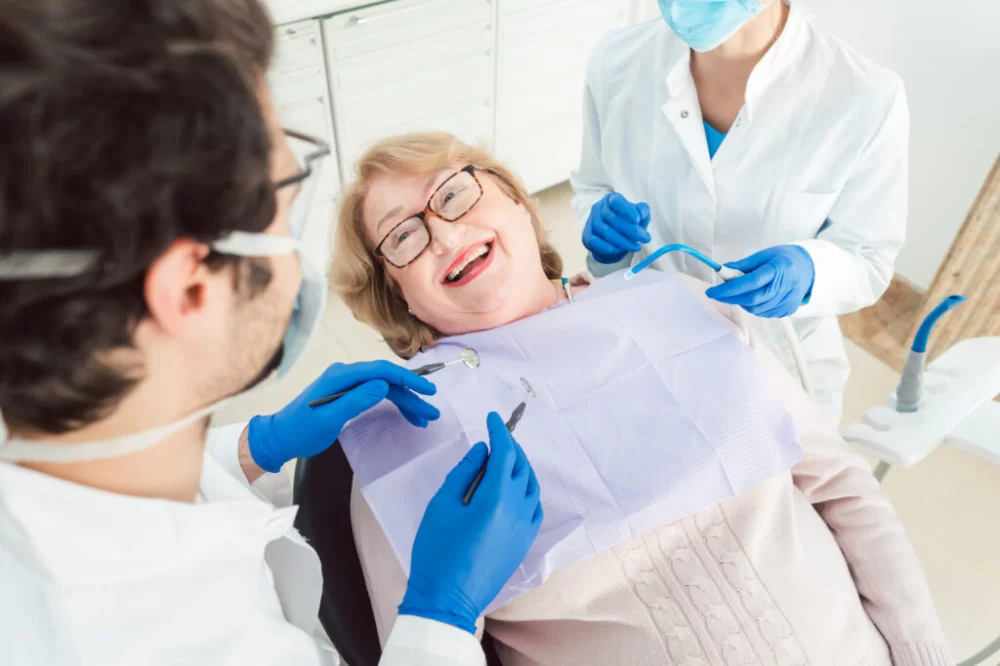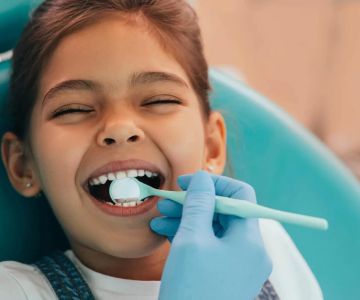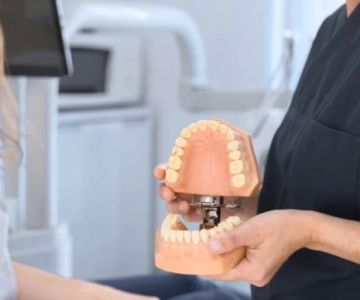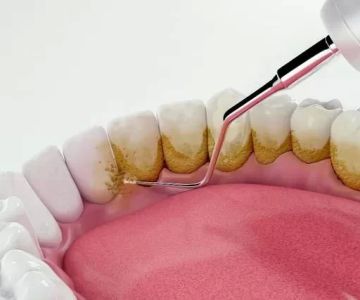
The Importance of Dental Care for Seniors
As we age, our bodies undergo various changes, and our oral health is no exception. For seniors, maintaining good dental care is essential not only for a beautiful smile but also for overall health. Poor oral hygiene can lead to tooth loss, gum disease, and other serious health issues such as heart disease and diabetes. This article will provide seniors with essential tips for maintaining optimal oral health and preventing common dental problems.
1. Brush Your Teeth Regularly and Effectively
Brushing your teeth is one of the most fundamental aspects of dental care at any age. For seniors, it becomes even more important due to the increased risk of gum disease and tooth decay. Seniors should brush their teeth at least twice a day, using a soft-bristled toothbrush and fluoride toothpaste to avoid irritating the gums and enamel.
One of the biggest challenges for seniors is keeping their teeth and gums free from plaque buildup. The buildup of plaque can lead to gum disease, which can cause tooth loss. Brushing with fluoride toothpaste helps prevent cavities and strengthens the tooth enamel. For those who have difficulty with manual brushing, electric toothbrushes are a great option as they make it easier to remove plaque efficiently and thoroughly.
2. Don't Forget to Floss
Flossing is just as important as brushing for preventing gum disease and cavities. However, many seniors may find it difficult to floss effectively due to arthritis or limited dexterity in their hands. Fortunately, there are alternatives like floss picks or water flossers that can make the process easier.
Flossing helps remove food particles and plaque between the teeth that a toothbrush cannot reach. Regular flossing also stimulates the gums, helping them stay healthy and firm. Seniors should aim to floss once a day, preferably before bedtime, to remove any debris accumulated throughout the day.
3. Visit Your Dentist Regularly
Regular dental checkups are essential for maintaining oral health, especially for seniors. Many seniors might skip dental visits, thinking their teeth and gums are fine, but routine exams help identify potential problems before they become severe. During a dental exam, your dentist can check for cavities, gum disease, oral cancer, and other age-related oral health issues.
For seniors, regular dental cleanings are crucial for removing tartar buildup, which can lead to gum disease and tooth decay. A cleaning every six months or as recommended by the dentist ensures that your teeth remain healthy and your smile stays bright. Early intervention can prevent more complex and expensive treatments later on.
4. Watch What You Eat and Drink
What you put in your body has a direct impact on your oral health. Seniors should focus on a balanced diet that is rich in fruits, vegetables, and calcium to maintain healthy teeth and gums. Foods like apples, carrots, and celery help clean teeth naturally while providing essential vitamins and nutrients.
Calcium is vital for strong teeth and bones, so seniors should incorporate dairy products, leafy greens, and fortified plant-based milk into their diets. Additionally, vitamin C, found in foods like oranges, strawberries, and bell peppers, helps maintain healthy gums and prevents gum disease.
Avoid sugary snacks and beverages, as they increase the risk of tooth decay. Sodas, fruit juices, and sugary snacks feed the bacteria in your mouth, leading to plaque buildup and cavities. Drinking plenty of water throughout the day is essential to rinse away food particles and keep the mouth hydrated.
5. Stay Hydrated for Oral Health
Dehydration can lead to dry mouth, a common problem among seniors that makes it difficult to speak, eat, and swallow. Dry mouth can also lead to bad breath and increase the risk of tooth decay and gum disease. Seniors should make a habit of drinking water regularly throughout the day to prevent dehydration and promote saliva production.
Saliva plays a vital role in keeping the mouth clean by neutralizing acids, washing away food particles, and fighting harmful bacteria. If you experience persistent dry mouth, consider using a saliva substitute or chewing sugar-free gum to stimulate saliva production.
6. Use Dental Products for Sensitive Teeth
As we age, our teeth become more vulnerable to sensitivity, especially if the gums begin to recede, exposing the tooth roots. Seniors who experience tooth sensitivity should consider using toothpaste and mouth rinses specifically designed for sensitive teeth. These products contain ingredients that help protect the enamel and reduce discomfort when eating hot, cold, or sweet foods.
If you experience tooth sensitivity, talk to your dentist about the best treatment options available. They may recommend fluoride treatments or special sealants to help protect the sensitive areas of your teeth.
7. Take Care of Dentures and Other Dental Appliances
For seniors who wear dentures, proper care is essential to ensure comfort and longevity. Dentures should be cleaned daily to remove food particles and plaque buildup. Use a soft-bristled brush and a non-abrasive denture cleaner to avoid damaging the appliance.
In addition to cleaning dentures, it's important to soak them overnight in a denture solution to prevent them from drying out and losing their shape. Regular visits to the dentist for denture adjustments are also crucial for maintaining proper fit and comfort.
8. Consider Oral Cancer Screenings
Oral cancer is a serious health issue that can affect seniors, particularly those who have a history of smoking or heavy alcohol consumption. Regular dental checkups often include screenings for oral cancer, which can detect early signs of the disease before it spreads. Symptoms such as unexplained mouth sores, difficulty swallowing, or persistent pain should be addressed immediately by a healthcare professional.
Oral cancer is treatable when detected early, so it's important for seniors to stay proactive with their dental health and report any unusual symptoms to their dentist or doctor.
9. Manage Your Health Conditions for Better Oral Health
Seniors often have underlying health conditions that can affect their oral health, such as diabetes or heart disease. Managing these conditions is essential for maintaining a healthy mouth. For example, high blood sugar levels can increase the risk of gum disease, while certain medications can cause dry mouth. By keeping health conditions under control, seniors can prevent complications in their oral health.
If you have any health concerns that could affect your dental care, talk to your dentist about how best to manage those issues. They can offer tips and strategies to help maintain your oral health despite underlying conditions.
10. Encourage a Positive Attitude Toward Dental Care
Maintaining good dental health requires a positive attitude and consistent habits. Seniors should view dental care as an essential part of their overall well-being. Encouraging regular brushing, flossing, and dental visits can help prevent costly and painful dental problems in the future. Remember, a healthy mouth contributes to a healthy body and an active lifestyle.







 Westgate Dental Arts
Westgate Dental Arts Coventry Family Dental
Coventry Family Dental Familia Dental
Familia Dental Dr. Daniel S. Fife, DDS
Dr. Daniel S. Fife, DDS Dentistry At Suburban Square: Michael I. Wollock, DMD
Dentistry At Suburban Square: Michael I. Wollock, DMD Comfort Care Dental
Comfort Care Dental The Importance of Oral Health Education During Pregnancy for a Healthy Pregnancy
The Importance of Oral Health Education During Pregnancy for a Healthy Pregnancy Why Skipping Dental Checkups Can Lead to Bigger Oral Health Problems
Why Skipping Dental Checkups Can Lead to Bigger Oral Health Problems Advantages of Porcelain Dental Restorations
Advantages of Porcelain Dental Restorations Best Tips for Brushing Your Teeth Properly for Healthy Gums: Essential Techniques for Oral Health
Best Tips for Brushing Your Teeth Properly for Healthy Gums: Essential Techniques for Oral Health How Can Diabetes Cause Tooth and Gum Problems? Preventing and Managing Oral Health Issues
How Can Diabetes Cause Tooth and Gum Problems? Preventing and Managing Oral Health Issues Healthy Habits for Promoting Good Oral Health and Hygiene: Tips for a Healthy Smile
Healthy Habits for Promoting Good Oral Health and Hygiene: Tips for a Healthy Smile